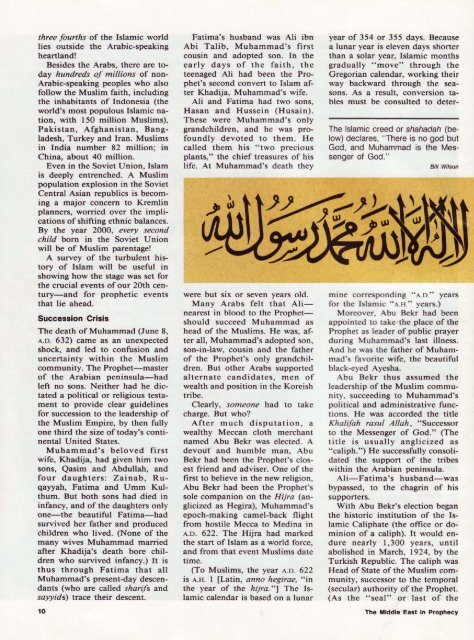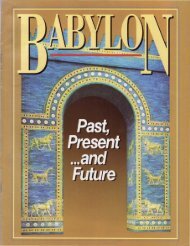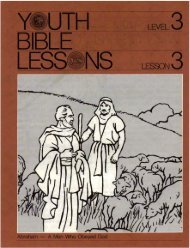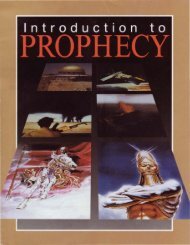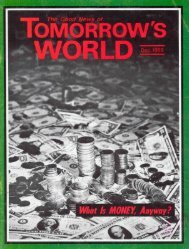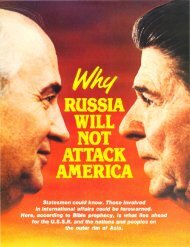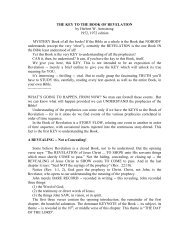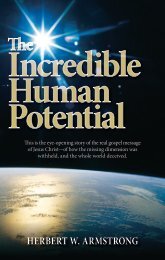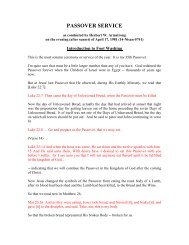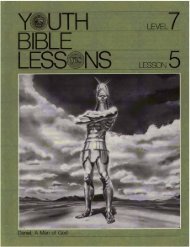Middle East in Prophecy - Church of God - NEO
Middle East in Prophecy - Church of God - NEO
Middle East in Prophecy - Church of God - NEO
Create successful ePaper yourself
Turn your PDF publications into a flip-book with our unique Google optimized e-Paper software.
three fourths <strong>of</strong> the Islamic world<br />
lies outside the Arabic-speak<strong>in</strong>g<br />
heartland!<br />
Besides the Arabs, there are today<br />
hundreds <strong>of</strong> millions <strong>of</strong> non<br />
Arabic-speak<strong>in</strong>g peoples who also<br />
follow the Muslim faith, <strong>in</strong>clud<strong>in</strong>g<br />
the <strong>in</strong>habitants <strong>of</strong> Indonesia (the<br />
world's most populous Islamic nation,<br />
with 150 million Muslims),<br />
Pakistan, Afghanistan, Bangladesh,<br />
Turkey and Iran. Muslims<br />
<strong>in</strong> India number 82 million; <strong>in</strong><br />
Ch<strong>in</strong>a, about 40 million.<br />
Even <strong>in</strong> the Soviet Union, Islam<br />
is deeply entrenched. A Muslim<br />
population explosion <strong>in</strong> the Soviet<br />
Central Asian republics is becom<strong>in</strong>g<br />
a major concern to Kreml<strong>in</strong><br />
planners, worried over the implications<br />
<strong>of</strong> shift<strong>in</strong>g ethnic balances.<br />
By the year 2000, every second<br />
child born <strong>in</strong> the Soviet Union<br />
will be <strong>of</strong> Muslim parentage!<br />
A survey <strong>of</strong> the turbulent history<br />
<strong>of</strong> Islam will be useful <strong>in</strong><br />
show<strong>in</strong>g how the stage was set for<br />
the crucial events <strong>of</strong> our 20th century-and<br />
for prophetic events<br />
that lie ahead.<br />
Succession Crisis<br />
The death <strong>of</strong> Muhammad (June 8,<br />
A.D. 632) came as an unexpected<br />
shock, and led to confusion and<br />
uncerta<strong>in</strong>ty with<strong>in</strong> the Muslim<br />
community. The Prophet-master<br />
<strong>of</strong> the Arabian pen<strong>in</strong>sula-had<br />
left no sons. Neither had he dictated<br />
a political or religious testament<br />
to provide clear guidel<strong>in</strong>es<br />
for succession to the leadership <strong>of</strong><br />
the Muslim Empire, by then fully<br />
one third the size <strong>of</strong> today's cont<strong>in</strong>ental<br />
United States.<br />
Muhammad's beloved first<br />
wife, Khadija, had given him two<br />
sons, Qasim and Abdullah, and<br />
four daughters: Za<strong>in</strong>ab, Ruqayyah,<br />
Fatima and Umm Kulthum.<br />
But both sons had died <strong>in</strong><br />
<strong>in</strong>fancy, and <strong>of</strong> the daughters only<br />
one-the beautiful Fatima-had<br />
survived her father and produced<br />
children who lived. (None <strong>of</strong> the<br />
many wives Muhammad married<br />
after Khadija's death bore children<br />
who survived <strong>in</strong>fancy.) It is<br />
thus through Fatima that all<br />
Muhammad's present-day descendants<br />
(who are called sharifs and<br />
sayyids) trace their descent.<br />
10<br />
Fatima's husband was Ali ibn<br />
Abi Talib, Muhammad's first<br />
cous<strong>in</strong> and adopted son. In the<br />
early days <strong>of</strong> the faith , the<br />
teenaged Ali had been the Prophet's<br />
second convert to Islam after<br />
Khadija, Muhammad's wife.<br />
Ali and Fatima had two sons,<br />
Hasan and Husse<strong>in</strong> (Husa<strong>in</strong>).<br />
These were Muhammad's only<br />
grandchildren, and he was pr<strong>of</strong>oundly<br />
devoted to them. He<br />
called them his "two precious<br />
plants," the chief treasures <strong>of</strong> his<br />
life. At Muhammad's death they<br />
were but six or seven years old.<br />
Many Arabs felt that Al<strong>in</strong>earest<br />
<strong>in</strong> blood to the Prophetshould<br />
succeed Muhammad as<br />
head <strong>of</strong> the Muslims. He was, after<br />
all, Muhammad's adopted son,<br />
son-<strong>in</strong>-law, cous<strong>in</strong> and the father<br />
<strong>of</strong> the Prophet's only grandchildren.<br />
But other Arabs supported<br />
alternate candidates, men <strong>of</strong><br />
wealth and position <strong>in</strong> the Koreish<br />
tribe.<br />
Clearly, someone had to take<br />
charge. But who<br />
After much disputation, a<br />
wealthy Meccan cloth merchant<br />
named Abu Bekr was elected. A<br />
devout and humble man, Abu<br />
Bekr had been the Prophet's closest<br />
friend and adviser. One <strong>of</strong> the<br />
first to believe <strong>in</strong> the new religion,<br />
Abu Bekr had been the Prophet's<br />
sole companion on the Hijra (anglicized<br />
as Hegira), Muhammad's<br />
epoch-mak<strong>in</strong>g camel-back flight<br />
from hostile Mecca to Med<strong>in</strong>a <strong>in</strong><br />
A.D. 622. The Hijra had marked<br />
the start <strong>of</strong> Islam as a world force,<br />
and from that event Muslims date<br />
time.<br />
(To Muslims, the year A .D. 622<br />
is A.H. 1 [Lat<strong>in</strong>, an no hegirae, "<strong>in</strong><br />
the year <strong>of</strong> the hijra."J The Islamic<br />
calendar is based on a lunar<br />
year <strong>of</strong> 354 or 355 days. Because<br />
a lunar year is eleven days shorter<br />
than a solar year, Islamic months<br />
gradually "move" through the<br />
Gregorian calendar, work<strong>in</strong>g their<br />
way backward through the seasons.<br />
As a result, conversion tables<br />
must be consulted to deter-<br />
The Islamic creed or shahadah (below)<br />
declares, "There is no god but<br />
<strong>God</strong>, and Muhammad is the Messenger<br />
<strong>of</strong> <strong>God</strong>."<br />
Bill Wilson<br />
m<strong>in</strong>e correspond<strong>in</strong>g "A.D." years<br />
for the Islamic "A.H ." years.)<br />
Moreover Abu Bekr had been<br />
appo<strong>in</strong>ted to take the place <strong>of</strong> the<br />
Prophet as leader <strong>of</strong> public prayer<br />
dur<strong>in</strong>g Muhammad's last illness.<br />
And he was the father <strong>of</strong> Muhammad's<br />
favorite wife, the beautiful<br />
black-eyed Ayesha.<br />
Abu Bekr thus assumed the<br />
leadership <strong>of</strong> the Muslim community,<br />
succeed<strong>in</strong>g to Muhammad's<br />
political and adm<strong>in</strong>istrative functions.<br />
He was accorded the title<br />
Khalifah rasul Allah, "Successor<br />
to the Messenger <strong>of</strong> <strong>God</strong>." (The<br />
title is usually anglicized as<br />
"caliph.") He successfully consolidated<br />
the support <strong>of</strong> the tribes<br />
with<strong>in</strong> the Arabian pen<strong>in</strong>sula.<br />
Ali-Fatima's husband-was<br />
bypassed, to the chagr<strong>in</strong> <strong>of</strong> his<br />
supporters.<br />
With Abu Bekr's election began<br />
the historic <strong>in</strong>stitution <strong>of</strong> the Islamic<br />
Caliphate (the <strong>of</strong>fice or dom<strong>in</strong>ion<br />
<strong>of</strong> a caliph). It would endure<br />
nearly 1,300 years, un til<br />
abolished <strong>in</strong> March, 1924, by the<br />
Turkish Republic. The caliph was<br />
Head <strong>of</strong> State <strong>of</strong> the Muslim community,<br />
successor to the temporal<br />
(secular) authority <strong>of</strong> the Prophet.<br />
(As the "seal" or last <strong>of</strong> the<br />
The <strong>Middle</strong> <strong>East</strong> <strong>in</strong> <strong>Prophecy</strong>


